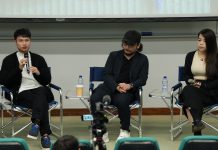Much like the alumni campaigns against national education, the alumni-led anti-DSS movements have brought different generations together in their concern for their alma maters.
For university student and St Stephen’s Girls’ College alumna Joy Liu, the experience has been an eye-opener. For Liu, the school’s sudden decision to join the Direct Subsidy Scheme violated its core value, which is to provide an excellent education to girls of all backgrounds.
When Liu attended the consultation session for alumni on the DSS issue, she met the senior alumni from her school for the first time. She was touched that, regardless of age, many upheld the same principles as her. They swapped contacts and attended the subsequent consultation sessions.
Once the concern group was formed, it was able to fully utilise the respective strengths of alumni from different generations. The post-80s and post-90s were skilled in using social media for publicity, and designing posters and online graphics, while older alumni had powerful connections and valuable experience. “Their life experiences are much broader than ours. They have the personnel resources, the capital and careful planning skills which help to direct us to deal with the press. Both generations learn from the other during the process,” Liu says.
Not being under the same kind of social and professional pressures as the older alumni, Liu and the other post-90s members could speak out boldly on behalf of the concern group. “We have nothing to lose at all,” Liu says.
But Liu adds that, despite the generation gap among members of the group, they are of one mind. “We have something in common, that is a passion for our alma mater. Otherwise, we would not have devoted so much time and effort to this DSS issue.”
Not many members of the concern group belong to the official alumni association but that should not detract from their status or identity as old girls of the school, says Liu. She believes every alumnus should inherit the distinct spirit of their alma mater and that there should be a natural bond between former students.
The efforts of Wah, Liu and their fellow alumni finally paid off. Under tremendous pressure exerted by their alumni and the general public, both SPSS and SPGC scrapped plans to become direct subsidy schools.
Liu now wants to join the St Stephen’s alumni association. In the past, she was unaware that the association had voting rights in forming school policies. “Every single vote counts to make a change,” she says.
The campaign against national education did not just inspire young people to participate in social movements, it also motivated people from different generations to reconnect with and take a keener interest in their old schools. The active participation of younger alumni could bring lasting changes to the composition and role of alumni associations.
Edited by Nicole Chan






































